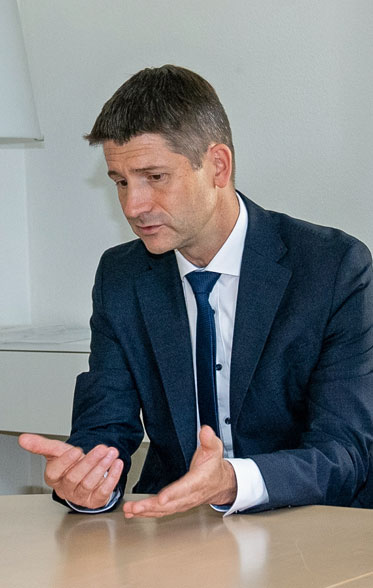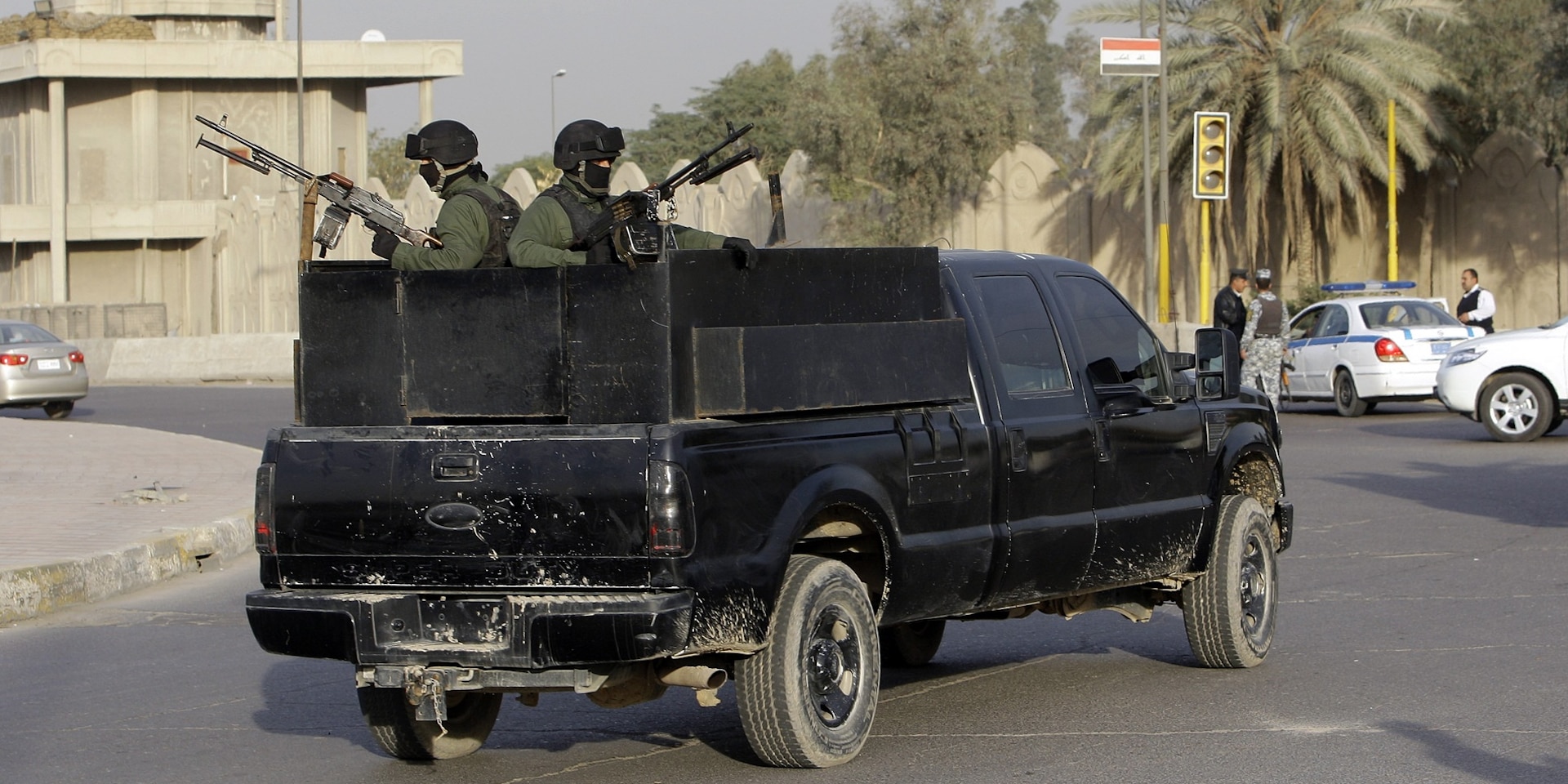"The Montreux Document is more relevant today than it has been for many years"
Private military and security companies must train their personnel in international humanitarian law and human rights and subject them to a security check. These and other recommendations are set out in the Montreux Document, which has provided states with guidelines for their dealings with private military and security companies for 15 years. Drawn up on the initiative of Switzerland and the International Committee of the Red Cross (ICRC), the Montreux Document represents the consensus of the 59 participating states that international law also applies to private military and security companies.

Franz Perrez, director general of the Directorate of International Law (r.), and Gabriel Lüchinger, head of the International Security Division in the State Secretariat of the FDFA, take stock of 15 years of the Montreux Document. © FDFA
The Montreux Document was adopted 15 years ago in Montreux following an initiative launched two years earlier by Switzerland and the ICRC. What was the impetus behind this initiative?
Franz Perrez: Back then, there were several cases of operations by private military and security companies in which international humanitarian law and human rights were not respected. The shooting of Iraqi civilians in Nisour Square in Baghdad by members of Blackwater, for example, sparked a great deal of discussion worldwide in 2007. For this reason – and against the background of the humanitarian challenges – Switzerland and the ICRC launched the initiative in 2008. The aim was to encourage states to enact national regulations for private military and security companies to ensure proper control of their activities.

It took just over two and a half years between the launch of the initiative and the adoption of the Montreux Document. Is this rather rapid pace an indication that a lack of control over private military and security companies was a problem for many states at the time?
Franz Perrez: For Switzerland and the ICRC it was important that a practicable solution be found quickly. That is why the aim was not to produce an international treaty, but rather a document that would help to ensure that private military and security companies did not operate in a legal vacuum. The document was intended to offer practicable measures and good practices, and thus provide an instrument to ensure that these companies respect international humanitarian law and human rights in their work. A total of 17 states were involved in the drafting and finalisation of the document. The fact that the initiative was humanitarian and technical certainly contributed to the document's relatively speedy adoption. Furthermore, the Montreux Document itself is not binding. But its adoption in Montreux in 2008 was a signal that the states involved felt a strong need to regulate private military and security companies.
What exactly does the Montreux Document oblige private military and security companies to do?
Franz Perrez: The Montreux Document is primarily aimed at states. But it also contains sections that are relevant to private military and security companies and their personnel. For example, it states that private military and security companies and their personnel are obliged to comply with applicable international humanitarian law, human rights law and relevant national law.
The International Code of Conduct for Private Security Companies (ICoC) of 9 November 2010, which Switzerland co-initiated as a supplement to the Montreux Document, addresses private security companies directly. The ICoC defines norms and standards for the industry based on international human rights law and international humanitarian law, and complements the Montreux Document. So they are complementary but different initiatives, each with its own members.
Which of the Montreux Document's measures relate to good practices and how have the states implemented them?
Gabriel Lüchinger: The second part of the Montreux Document is dedicated to good practices. These are proven practices on how states can deal responsibly with private military and security companies – for example, introducing a licensing and control system for such companies, establishing requirements for the education and training of deployed security personnel, and imposing sanctions in case of misconduct. This blueprint of possible measures is intended to help states to fulfil their obligations under international humanitarian law and to uphold human rights, among other things.

Different states have taken different measures depending on their legal system, resources and existing regulatory framework for private military and security companies. Switzerland enacted the Federal Act on Private Security Services Provided Abroad (PSSA) in 2015. Under this act, companies seeking to provide private security services from Switzerland are subject to a prior declaration requirement. The provisions of this act draw extensively on the best practices outlined in the Montreux Document.
What are your experiences regarding the application of the best practices and implementation of the PSSA?
Gabriel Lüchinger: The optimal implementation of such practices in the form of a law is a major challenge. Even before the PSSA came into force in 2015, we made great efforts to raise awareness among the companies concerned and to develop tools to help them comply with their legal obligations.
Since 2015, we have received over 2,500 declarations from various companies in Switzerland regarding private security services abroad. The spectrum ranges from the protection of persons to logistical support for foreign armed forces to intelligence activities. Each of these declarations is examined individually. This includes conducting a due diligence check on the company submitting the declaration and the individuals involved as well as obtaining clarification on the planned services. Depending on the particular case, more detailed clarifications may need to be carried out in cooperation with other federal offices. The decision as to whether or not a planned service can be provided is made after weighing up all the criteria. Article 1 of the Act, which sets out the objectives, is the key provision in this respect.
With this Act, Switzerland has taken an important step towards better regulation of private security services and has played a pioneering role on this issue.
In 2010, two years after the adoption of the Montreux Document, a private security company established its office in Switzerland, sparking significant discussions in the country about the need for a licensing requirement for such companies. Why did this happen, given that the Montreux Document had already been adopted?
Gabriel Lüchinger: That's right, the company in question was Aegis Defence Services – one of the world's largest private military and security companies at the time. This British company was mainly active in Iraq and Afghanistan as a contractor for the US Department of Defence.
Such companies, which operate in areas of crisis and conflict, naturally also cast a critical spotlight on the host state. As far as Switzerland was concerned, the activities of Aegis Defence Services were not in line with Switzerland's foreign policy objectives and neutrality. But when the company set up an office in Switzerland, there were still no federal regulations governing private military and security companies operating in crisis and conflict areas. Switzerland had until then been able to fulfil its international obligations, which are also reflected in the Montreux Document. Aegis' establishment in Switzerland and the debate this sparked gave an additional impetus to the process that culminated in the adoption of the PSSA.
What impact has the Montreux Document had over the last 15 years? What's your take on this?
Franz Perrez: The number of participating states has tripled: 17 states signed the Montreux Document in 2008. Today, 59 states and three international organisations support the Document.
But it's not just about numbers: the drafting of the Montreux Document brought together 17 states from different regions of the world and drew on the knowledge of industry representatives, academic experts and NGOs. For the first time, an intergovernmental document summarised the most important international legal obligations in relation to private military and security companies. The Montreux Document laid to rest the widely held view at the time that private military and security companies operated in a legal vacuum.
As I mentioned earlier, the Document led to the ICoC in 2010, which has so far been adopted by 126 private military and security companies. In 2014, the Montreux Document Forum was created as a platform for exchanges between the participants.
46 participating states supporting the Montreux Document now have a specific law regulating private military and security companies. Moreover, a study concluded that national implementation of the Montreux Document increases the likelihood of compliance with international obligations and thus contributes to reducing violence against civilians during and after the cessation of hostilities.
You have just mentioned the Montreux Document Forum. What is its goal?
Franz Perrez: The Forum's overarching goal is to improve the practices of the private military and security industry. It ultimately emerged from a first assessment of the Montreux Document five years after its adoption and the participating states' desire to facilitate a regular dialogue on experiences, best practices and challenges related to the regulation of private military and security companies.
The Geneva Centre for Security Sector Governance (DCAF) has since then served as the forum's secretariat. It advises numerous states on the regulation of private military and security companies, organises multi-stakeholder workshops, produces studies related to the Montreux Document and develops instruments to improve the regulation of private military and security companies. These are valuable instruments and resources for the various stakeholder groups.
Russia's military aggression against Ukraine has brought the activities of the Wagner Group into focus. Don't the actions of this private military and security company call into question the significance and effectiveness of the Montreux Document as a whole?
Gabriel Lüchinger: No, on the contrary: be it Blackwater or the Wagner Group – private military and security companies have been around and operating for decades. The regulation of this sector has always been thorny and has always been influenced by specific events. This will perhaps be the case again with the Wagner Group. The broad spectrum of activities in the sector is also worth noting. Although to many people the topic of private military and security companies currently conjures up images of Wagner, the majority of security services are provided by smaller local companies. In many countries, such companies can make a useful contribution to security, provided of course that they are properly regulated.
Russia's war of aggression against Ukraine has at least brought the involvement of private military and security companies in conflicts back to the centre of public attention worldwide. This momentum should be capitalised on to assess and strengthen the current state of regulation of the sector, particularly at national level.
How up-to-date is the Montreux Document 15 years on? Where do you see room for improvement in the way states deal with private military and security companies? And how can the Montreux Document Forum promote discussion among states on these issues in the future?
Gabriel Lüchinger: The Montreux Document is more relevant today than it has been in many years. Private military and security companies sometimes operate alongside local militias, government units, volunteer groups or other organisations. Their expansion is tied to operational doctrines that envisage the use of non-state actors in pursuit of geopolitical goals.
In addition, sensitive state security tasks are increasingly being outsourced to the private sector, for example to manage the protection of borders. This is another reason why the global market for private security is experiencing steady growth.
Franz Perrez: These developments need to be addressed in the Montreux Document Forum. It is crucial that national regulators step up their discussions. They need to exchange views on the challenges and find common responses and approaches. The Montreux Document Forum provides a sound basis for such exchanges.
FDFA committed to establishing standards for private security services
Several FDFA units support the implementation of the Montreux Document:
The Directorate of International Law (DIL) led the negotiations that resulted in the adoption of the Montreux Document. It convened the negotiation sessions and collaborated with the International Committee of the Red Cross (ICRC) to draft the substantive elements of the document. The DIL co-chairs the Montreux Document Forum with the ICRC.
The Export Controls and Private Security Section (ECPS) within the International Security Division is the authority responsible for enforcing the Federal Act on Private Security Services Provided Abroad (PSSA) and carries out the administrative procedures set out in the Act. It liaises with the authorities involved, handles communication with the industry and publishes information for the public.
The Peace and Human Rights Division is the lead unit responsible for the International Code of Conduct dossier. It currently chairs its supervisory board and promotes dialogue between private security companies, states and NGOs.
The FDFA's Directorate of International Law, International Security Division and Peace and Human Rights Division are engaged in the international dialogue on national standards for private military and security companies – currently, for example, in the UN Working Group on Private Military and Security Companies, which seeks to develop an international regulatory framework in this area.
Links
- The Montreux Document
- Participating States of the Montreux Document
- International Code of Conduct for Private Security Service Providers
- International Code of Conduct for Private Security Service Providers Association
- Geneva Centre for Security Sector Governance (DCAF)
- Federal Act on Private Security Services Provided Abroad (PSSA)

